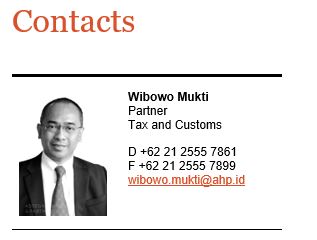Legal Certainty for VAT Treatment of Imported Goods used for Activities to Utilise Offshore Taxable Service
Background
In 2017, the Minister of Finance issued Regulation No. 178/PMK.04/2017 on Temporary Import (“Temporary Import Regulation“), which stipulates two types of temporary imported goods:
- temporary imported goods that are exempted from customs duty, where the customs authority would not collect value-added tax (“VAT“) or value-added tax and luxury goods sales tax (“LST“) and Article 22 Income Tax; and
- temporary imported goods that can receive customs duty relief, where the customs authority would only collect VAT or VAT and LST and no Article 22 Income Tax will be collected.
In relation to the latter, if the temporary imported goods relate to the utilisation of taxable service from outside the Indonesian customs area within the Indonesian customs area, i.e. in the form of asset rental, then the importer may apply for a statement letter (Surat Keterangan Pemanfaatan JKP dari luar Daerah Pabean di dalam Daerah Pabean or “SKJLN“) to the Directorate General of Tax (“DGT“), which can then be used by the importer to claim non-collection facility for VAT or VAT and LST from the Directorate General of Customs and Excise.
Now, after more than a year since the Temporary Import Regulation becomes effective, the DGT has issued Regulation No. PER-12/PJ/2019 on Procedure to Obtain SKJLN (“SKJLN Regulation“), which applies not only for rental with temporary import mechanism, but also for rental without temporary import mechanism.
Guidelines to Obtain Non-Collection Facility for VAT or VAT and LST
To obtain an SKJLN, the taxpayer must submit an application through the DGT’s website or the tax office where the taxpayer is registered. Such application must contain information such as the taxpayer’s tax identification number, name and address of the counterparty, type and value of the transaction, i.e. rental with temporary import mechanism or rental without temporary import mechanism, and details of the relevant contract.
The DGT will then assess the application and will grant the SKJLN if the taxpayer has submitted their:
- annual income tax returns for the last two tax years; and/or
- monthly VAT returns for the last three months if they are registered as a taxable enterprise for VAT purposes.
The SKJLN will automatically be generated through the DGT’s website or issued by the relevant tax office within three working days.
Once obtained, the taxpayer will enjoy non-collection facility for VAT or VAT and LST for the imported goods that will be used for the utilisation of taxable service. However, please note that the utilisation of taxable service from outside the customs area within the customs area, i.e. the rental transaction, would still be subject to VAT or VAT and LST.
Conclusion
In conclusion, the issuance of the SKJLN Regulation will provide legal certainty and cost efficiency in the form of non-collection facility for VAT or VAT and LST. This would especially be beneficial for taxpayers who rent capital goods for running their business activities, such as construction and manufacturing companies.

***
AHP Client Alert is a publication of Assegaf Hamzah & Partners. It brings an overview of selected Indonesian laws and regulations to the attention of clients but is not intended to be viewed or relied upon as legal advice. Clients should seek advice of qualified Indonesian legal practitioners with respect to the precise effect of the laws and regulations referred to in AHP Client Alert. Whilst care has been taken in the preparation of AHP Client Alert, no warranty is given as to the accuracy of the information it contains and no liability is accepted for any statement, opinion, error or omission.

